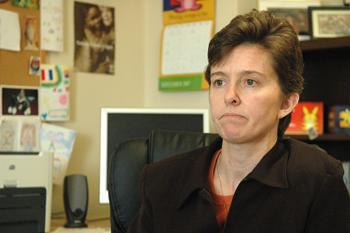A University social work course has begun a survey that will identify the needs and wants of a community in Baton Rouge that is often invisible. Elaine Maccio, assistant professor of social work and survey administrator, is teaching a class this semester called “Social Work with Lesbian, Gay, Bisexual and Transgender People.” The elective course intends to prepare aspiring social workers in helping LGBT clients with a broad range of issues unique to their community across social, political and economic realms. The survey is part of a service learning project in which all 18 members of the class participate. It is the first survey to address the LGBT community in Baton Rouge, according to Kevin Serrin, chairman of the board of directors at the Capitol City Alliance – a community organization helping to administer the survey. “Nobody has ever done a survey like this to get a feel for the gay and lesbian community in Baton Rouge,” Serrin said. “Nobody has any idea of what the data will show. We are hoping to demonstrate that the LGBT community has a high income and buying power, they vote more frequently and are more aware politically than other members of the community.” Serrin is hoping to get these results in light of the recent decision by the Metropolitan Council to not pass an acceptance resolution for Baton Rouge. The resolution would have stated that “all races, sexes, creed, colors, religions, ages, ancestries, disabilities, sexual orientations, nationalities, marital status, political affiliations and people of all walks of life” would be welcomed in the city. Since the resolution fell one vote short of the seven needed for passage, Serrin said the LGBT community has come under attack from religious leaders. “They have made accusations like we’re pedophiles and into bestiality. We need positive things to counteract the attack,” Serrin said. Maccio said her class is finding people to survey by handing out flyers, contacting campus groups and letting bars and churches know about the survey. “We have been having a little trouble finding people because one of the problems in Baton Rouge is that the LGBT community is so closeted,” Maccio said. “They really are invisible, and when you’re invisible, services can’t be offered to you.” The survey will include questions about how “out” the readers are and why they are closeted – if that is the case. It will also have questions on discrimination and violence the reader may have experienced, along with opinion questions on same-sex marriages and politics. Standard demographic questions on relationship status, children and income level will also be included. The survey is intended to include up to 1,000 people and will determine what resources they would like to have offered to them. “We want to improve the quality of life for LGBT people, and to do that, we have to find out their needs,” Maccio said. The survey will mainly be used to collect data that has not been counted in Baton Rouge before. Once the survey is complete in about six months, the CCA will decide how to use the results. “If the survey shows that there’s an overwhelming desire for a newsletter or paper for the community, then maybe we can get funding for that,” Serrin said. “I think it will also help CCA better set our agenda for what should be done to address the needs of the LGBT community.”
—Contact Joanna Brown at jbrown@lsureveille.com
University social work class surveys gay community in BR
By Joanna Brown
November 9, 2007

Elaine Maccio, assistant professor of social work, explains the class’ research Thursday afternoon. Maccio teaches a graduate level class that concentrates on understanding the needs of the LGBT community.








